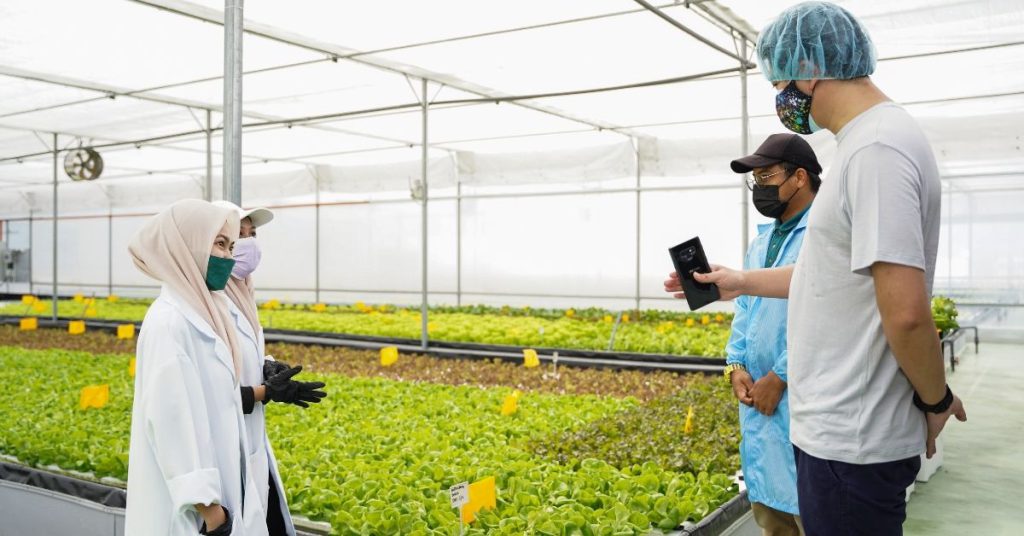While convenient online grocery delivery services were once more of a luxury for many, they became a near necessity at the peak of the pandemic, before many of us were vaccinated.
Now, we’re spoilt for choice with options like Pandamart, GrabMart, actual grocery stores offering deliveries, and several smaller startups around.
So when I came across JustGood, my initial thought was, do we really need yet another grocery delivery service in Malaysia?
Digging deeper, more about this Malaysian startup was revealed to me. Other than delivering fresh groceries to customers, they also have their own smart farm and work with small-time farmers, fishermen, etc.
The aim of all this is meant to provide an integrated first to last-mile ecosystem when it comes to fresh produce. It’s intended to build up farmers in providing safer and more efficient ways to manage their crops so that customers can be assured of their food’s safety.
More than just selling good veg
Founded by Zachary Aman and Eryna Su, JustGood was envisioned to be more than just a company purveying food.
They believe that existing food supply chains in the market are both convoluted and inefficient. This is because on the upstream end, farmers face several issues pertaining to the quality, price, efficiency, and sustainability of their crops.

For example, the lack of pricing transparency means that farmers don’t always get the best deal when selling their produce. Those with small farms also miss out on opportunities from buyers who prefer to source many produce varieties from one single supplier.
To add, conventional farmers generally have low education levels and inadequate technical farming skills. This means that they continue to use pesticides for their crops as they’re unaware of newer agriculture practices that can make their produce safer for consumers.
Zachary could empathise with these struggles. Prior to owning his smart farm, he too was in the same position upon completing his studies and entrusted by his grandfather to cultivate crops in their family’s small orchards that were left idle.
He wondered what kinds of crops he could grow that were high in demand and cost-efficient at the same time. With no bargaining power as an individual, he also wondered who he could partner with to help him manage the small parcels of land he was given.
Working with experts in the field

Utilising smart farming methods while employing small-time farmers was able to solve these issues. With JustGood providing technical and business support, farmers can produce better crops in terms of quality and quantity that are also safe from the use of harmful chemicals like pesticides.
Some of the agritech methods used in JustGood’s farms include sensors to monitor ambient temperature and humidity, as well as nutrient water pH, fertiliser levels, and oxygen content.
This information will be used to control other features such as exhaust fans, cooling pads, and fertiliser dosing which are automated through an IoT system.
Farmers are onboarded from various locations, and JustGood provides them with the necessary knowledge and training that give them the best chances of succeeding. “We also pay them fair and better prices for their produce as compared to the previous practices,” Zachary added.
Tracing the path of your food
When it comes to clean eating, customers are no longer looking for an organic label on their vegetables at the grocery store. With agritech systems utilised, it’s become expected to trace and know where your produce comes from while following it through each step of the supply chain.
JustGood understands this customer demand and ensures that the food sold on its grocery platform is traceable via the in-house IoT systems.
“Ultimately, from a consumer’s perspective, produce brought to their table are of high and consistent quality, traceable, and safe,” Zachary told us.

But JustGood’s Shop page doesn’t only provide fresh fruits and vegetables. It offers a full range of products you’d expect to find in most large grocery stores too, from poultry, frozen items, seafood, and bakery products.
While local fruits and vegetables are sourced from JustGood’s network of farmers, seafood is directly supplied from fishermen in Sekinchan and Pulau Ketam. Poultry also comes from local farms in the country.
Zachary shared, “Other than the usual items that can also be found in other grocers and food purveyors, we also source for a lot of local artisan products to support the local cottage industries with items ranging from local chocolates, cheeses, sauces, biscuits, etc.”
In terms of the price points of JustGood’s products, they’re also slightly lower when compared to premium supermarkets in KL. For example, a 5kg red seedless watermelon on JustGood costs RM23.90 (RM4.78/kg), while 2kg of the same watermelon from Village Grocer costs RM12 (RM6/kg).
Though it’s a small sample amidst the many more competitors out there, for the quality you’ll be getting from a business empowering small-time farmers, JustGood can be a valid option for customers.
Cultivating bigger land
As JustGood has yet to officially launch its platform which is still in beta mode, the online grocer will likely face challenges capturing a user base that is already accustomed to shopping from larger brands.
But Zachary doesn’t seem too worried about that as he believes that JustGood stands out from its ability to benefit communities around the region.

“In designing this ecosystem, we have plans to replicate it in different countries serving multiple communities,” he stated. “It’s all about building an efficient food distribution network providing good, fresh, and clean quality food with sustainability and traceability giving peace of mind and better value and quality to the consumers.”
Sharing the company’s 7-year roadmap with us, he added that JustGood will be rolling out physical stores in the near future.
“We want JustGood to be a synonym and byword for a sustainable and traceable end-to-end food platform in Malaysia and beyond,” envisioned Zachary.
- Learn more about JustGood here.
- Read other articles we’ve written about smart farms.
Featured Image Credit: Zachary Aman, CEO and founder of JustGood Group











